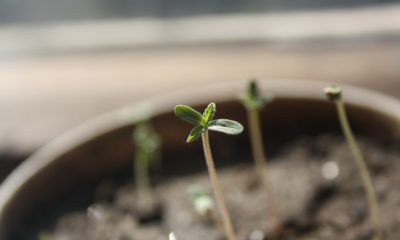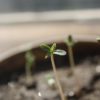Industrial Hemp in Virginia: Don’t Call It a Comeback!
A centuries-old cash crop re-emerges at Mount Vernon.
Centuries after George Washington forced hundreds of slaves to work in the hemp fields on his Mount Vernon estate in Virginia and more than eight decades after the U.S. government made the plant an extension of its outlaw crusade on cannabis, industrial hemp is being legally cultivated once again on Washington’s farm.
To those not privy to the historic hypocrisy connected to the cultivation of such a versatile plant, this revelation might not inspire much excitement or hope for the future. But for the legion of soldiers, truth tellers and wild-eyed advocates who have been fighting tirelessly to put this cash crop back into the hands of the American farmer, it is perhaps a sign that we have finally beaten the whole rotten system. History doesn’t just repeat itself. It comes back with a vengeance.
The modest resurgence in industrial hemp — which was deemed the next “Billion Dollar Crop” by Popular Mechanics back in 1938 and now is often referred to by the clown shoes on Capitol Hill as marijuana’s “non-intoxicating cousin” — can be largely attributed to a bill signed by President Barack Obama back in 2014 that has allowed states to roll out industrial hemp programs. But the language of this federal law is cut-rate to some degree, as it only allows states to create pilot programs that focus on cultivating the crop for research purposes. The idea behind this agronomy approach is for states to learn more about which hemp seeds produce the best yields for whenever lawmakers finally have the guts to give the industrial hemp sector back to the agricultural industry.
Virginia is one of those states on this journey to resurrect a centuries-old cash crop. However, the horticultural powers responsible for sowing the hemp seeds in Virginia don’t just want to grow a few plants, they also want to use the crop to slap the public out of its prohibition-loving daze. This is one of the main reasons they lobbied to start growing hemp on Mount Vernon after all this time: to show the average citizen that industrial hemp is not the same savage threat to their children as this thing called marijuana is often presumed to be.
“You could build a bonfire with this, sit around it, breathe it, nothing’s going to happen,” Dean Norton, Mount Vernon’s horticulture director, told the Washington Post.
It was actually a Virginia farmer who conceptualized the idea of putting industrial hemp back in the fields of Mount Vernon. Brian Walden, who also serves as the regional coordinator for the Virginia Industrial Hemp Coalition, made it part of his mission to display this historic crop for the masses in order to show off its modern-day flexibility and prove, once and for all, that legalizing hemp was not just some ploy conjured up by the hippies to get American stoned again. And if this movement happens to inspire mobs of angry citizens to march into Washington, D.C. and lash out against the Republican goons and delicate Democrats in the process, so be it. After all, if ever there was a time for a new blood revolution in a quest for freedom, that time is right now.

It is difficult to imagine that hemp, which was grown by the elite of the nation’s forefathers, including John Adams and Thomas Jefferson (with slave labor), would be cast aside as though it has no economic relevance. But there is evidence that the plant was the subject of one of the country’s first corporate screw jobs, whereby it was deemed a threat to a new commercial America that was looking to monopolize on fossil fuels, plastics and tree-pulp paper.
Hemp soon became a hard target for prohibition with a little help from Harry Anslinger, the nation’s first commissioner of the U.S. Treasury Department’s Federal Bureau of Narcotics. Today, (former) U.S. Attorney General Jeff Sessions pales in comparison to this racist mongrel. Back in the day, Anslinger and his pot propaganda machine was slick enough to convince Congress that this thing called hemp was part of the same devilish plant that was making their white wives want to get it on with black men. The fate of hemp was eventually sealed in 1937 through the passing of the Marihuana Tax Act.
Although farmers were later tricked into picking up hemp production once more during World War II, the U.S. government eventually reneged on the deal. The screws tightened. Several years later, through the guidance of President Nixon, the outlaw status of hemp was reaffirmed in 1970 with the passing of the Controlled Substances Act. As ridiculous as it may sound, Uncle Sam and his crossed-up cronies have maintained for years that hemp should be kept under the thumb of the nation’s prohibition laws simply because its appearance too closely resembles that variety of cannabis plant that produces stoned effects.
It is reassuring, however, that hemp is growing again in Virginia. But don’t call it a comeback. This whirling dervish of a saga was always destined to find a way through the dark circle. In fact, there was a push in Congress, led by Senate Majority Leader Mitch McConnell of Kentucky, aimed at eliminating hemp from the pesky Controlled Substances Act. The proposal gave all 50 states the freedom to welcome industrial hemp production back into their communities, potentially providing struggling farmers with the opportunity to get more feast than famine out of their land.
Of course, federal hemp legalization might also make things harder for American hemp farmers by encouraging large corporations and further eliminating the livelihoods of small farmers.
Will the bill help those farmers? Considering the answer is contingent on the competency of Capitol Hill, it is difficult to say. But, rest assured, if it fails, the legislators responsible will meet the hands of rural justice, and then, the shrieks of desperation swelling up from the downtrodden of the heartland will surely emerge from the darkness, fiery pitchforks in hand.
TELL US, are you excited about federal hemp legalization?
Originally published in Issue 34 of Cannabis Now. LEARN MORE



























